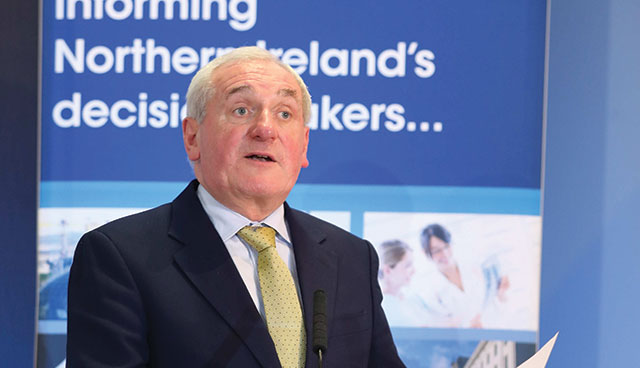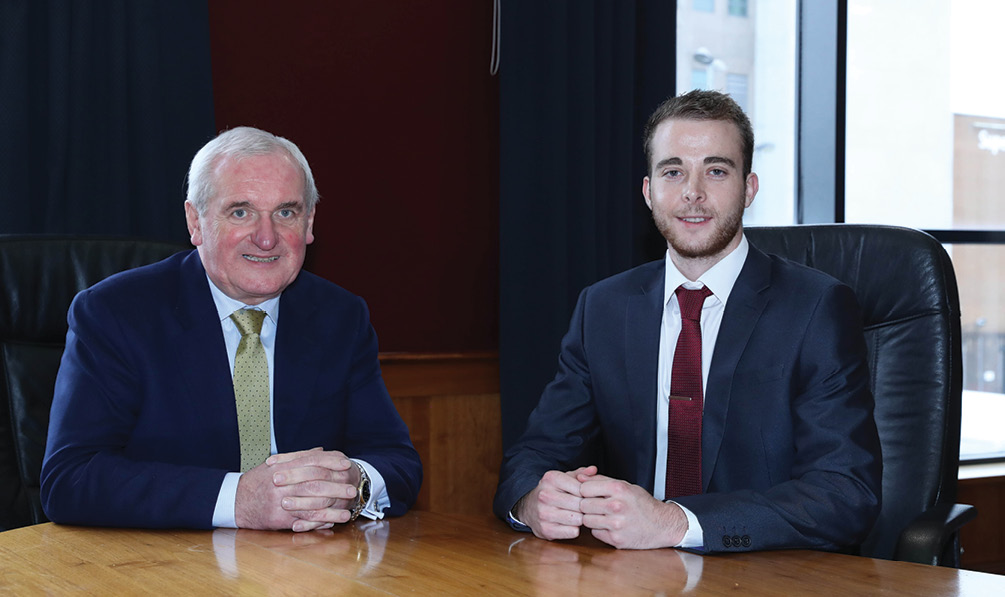Bertie on Brexit


Addressing the 21st annual Northern Ireland Economic Conference, hosted in Derry, Bertie Ahern outlines his vision for the post-Brexit economy on the island of Ireland. Ciarán Galway speaks with the former Taoiseach.
Opening his remarks, Bertie Ahern asserts: “We all have to accept that we are living in unprecedented times. The European Union has never had to face such a challenge.” The British Government, EU member states and all interested parties are now faced with looming arbitrations to address Britain, as the project’s second largest economy, rescinding its membership of the union.
Providing a brief synopsis of his address, Ahern outlines: “I think there are two inevitable things facing us with the Brexit position. One is that there is not going to be any change by the British Government. Then on the other side, there’s not going to be any change on the foundations to the fundamental position of the European Union on the free movement of capital, of goods, of services or of people. I think that the negotiation line has to be between those two.” These four freedoms are the intrinsic elements which underpin the single market framework.
Ahern acquired a wealth of insight in relation to EU affairs throughout his time as Minister of Finance, Taoiseach and President of the European Council. In 1992 he was a signatory of the Maastricht Treaty and, between 1997 and 2008, he regularly attended summits of European heads of state, overseeing both the negotiation and ratification of several international agreements, including the Amsterdam, Nice and Lisbon treaties.
Capital support
Projecting on the post-Brexit outlook, Ahern contends: “Northern Ireland gets very good aid from the UK and of course I’m arguing that that should continue. I’m also arguing that the various PEACE initiatives, should still be funded by the European Union, even with the UK outside of Europe. There’s no reason why they shouldn’t and I think it’s very important.” Elaborating, he outlines that, as a peace process in itself, the EU has been fundamental to the cultivation of peace on the island of Ireland. The EU exists as a model for peace and stability on a continent which experienced three major wars between 1870 and 1945. As such, Ahern states: “I would strongly urge the European Union to continue to support future peace programmes in Ireland, post-British departure.”
EU capital has consistently supported the development of the economy in Northern Ireland. In a region where the agri-food sector accounts for one quarter of all manufactured products, the EU allocates 87 per cent of total farm income (€2.6 billion) under the Common Agricultural Policy (2014-2020). Likewise, financial support for research and development has helped foster the growth of a knowledge-based economy. In addition, many tertiary level students from Ulster University and Queen’s University Belfast sought to take advantage of the EU’s Erasmus mobility education initiative.
“We all know this wasn’t worked out by the UK administration…”
Critical reflection
Ahern registers his regret that the British people have voted to leave the EU. At the same time, however, he also expresses his respect for the democratic process and argues that the remaining member states must acknowledge the interval required by Britain in which to formulate a strategy prior to triggering Article 50. Post-referendum, he maintains: “Rather than UK-bashing on a vote that has been and gone, the EU has to take into account some of the issues. For instance, the communication divide that is there between the people and the European institutions.”
The result of the Brexit referendum must, Ahern insists, be cause for critical reflection within the EU. The disconnect between citizens and institutions must be addressed and there should be no complacent return to the status quo. Efforts must be made, he indicates, to disrupt this regression and instead tackle the information deficit, extending far beyond mere pronouncements on the work of Europe in relation to macro-economics.
On the other hand, Ahern submits: “It is incumbent on the British Government to set out a more detailed roadmap in the coming months with regard to the key issues.” This, is of crucial importance to business communities in Ireland, Britain, Europe and further afield who require certainty to pursue commercial interests.
Responding to the challenges facing the all-island economy, Ahern illustrates: “I think the big issue for us is that we have successfully built up two-way investments, we’ve built up trade and the relationship between North and South has developed dramatically from where it was 20 years ago. Still, I’d like to see it more and I think there’s huge potential. The big challenge is that Brexit doesn’t derail that and create a division, that the ongoing progress the island economy is making can continue. Whether it’s innovation, whether it’s technology, whether it’s the sciences, whether it’s medicine or whatever, that we can continue to develop that and the cooperation of the universities. One of the big concerns is that most of the universities here receive research grants which are EU-based. So I think we have to try and find a way around that.”
He continues: “We all know that this wasn’t worked out by the UK administration, but the reality is that, if Brexit does mean Brexit as the Prime Minister has said, it also means the unravelling of hundreds of directives and legal instruments and every one of those is a potential pothole we have to look at very carefully.”
In order to mitigate the impact, Ahern argues: “The planning for Brexit on one side equally has to be the planning for life after it on the other side. Rather than rattling off all the departments, I think it affects every aspect of government. Of course there’s finance and of course there’s infrastructural issues, but it also affects all the other departments and I think that has to be worked through. If we always talked about special relationships, whether that special relationship is between the EU and the UK or whether it’s between the island of Ireland and whoever, we need to try and frame that and I think that’s the challenge.”
Common travel area
The common travel area, which predates both Britain and Ireland’s entry into the European Economic Community in 1973, has become a recurrent theme of Brexit analysis. Ahern is critical: “The common travel area was there in the past, but I think what people have been saying about it and I know they mean well, is kind of irrelevant. The problem isn’t about Irish people, north or south, coming up or down.” Rather, he suggests: “The problem is Europeans coming into the Republic of Ireland and going north and how that is handled.

Not to mind what ultimately could be the problem of non-EU immigrants coming in and using Ireland as a backdoor. To be honest it’s not beyond anyone’s wit to see why that would be a factor, not today, but maybe next year or the year after. So, I think that this is a big problem. There’s enough criminal minds associated with this island, north and south, who live abroad and who see the opportunities that can be exploited here.”
In the short term, however, Ahern reasons that the debate will centre around the movement of EU citizens between Ireland and the United Kingdom. He notes: “In my view, the idea of the Republic of Ireland manning our ports and airports to check EU citizens is a nonsense. I don’t know why we’d do it and I don’t know why we’d be asked to do it. Nor should we do it. I’m afraid we’re just going to have to find another way.”
Noting that 30,000 people traverse the border every day, Ahern emphasises the free movement of people and trade between Britain and Ireland as an imperative requirement of any settlement reached between the UK and EU negotiators. This, he summarises, facilitates cross-community cooperation, enhancement of tourism, eliminates barriers to business and is of critical importance to the people living on the island of Ireland.
Going forward
Each week, €1 billion worth of trade is transferred between Britain and Ireland, including almost 40 per cent of all Irish food and drink exports. Similarly, trade between the Republic of Ireland and Northern Ireland is in excess of €1.5 billion annually. Ahern insists, therefore, that it is of dual importance that the current arrangements continue from both political and economic perspectives.
Looking to the future of the all-island economy, he articulates: “I think the vision for the island economy, regardless of political differences or aspirations, in the interests of the people, of this generation and more importantly of the rising generations, is that we have to protect ourselves. We have to protect ourselves so that we can continue to have good services, good employment, good education and all of these things, in some way or another, are impacted upon by Brexit. But I think it is for us to frame a plan that avoids any of the worst fears that we would have. The reality of it has to come first and I think the reality of it is that this is where we are and we have to plan accordingly.”
Ahern is keen to recognise the pervasive achievements of the EU. The European single market has, he argues, minimised trade barriers, eliminated currency exchange risk, ushered in an era of relative stability for consumers and helped to integrate financial markets. In terms of social policy, the EU has been central to the facilitation of efforts to eradicate discrimination in society and ensure equality in the workplace.
Concluding his contribution, Ahern advocates political goodwill and mutual respect in the forthcoming cycle of negotiations and stresses the significance of any agreement within an Irish context. “The interests of all the people on the island of Ireland must be protected during this negotiation process.”





